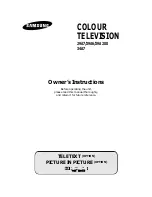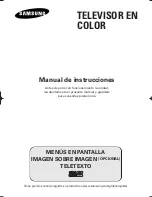
C
losed Captioning allows
you to read the voice
content of television pro-
grams on the TV screen.
Designed to help the hearing
impaired, this feature uses
on screen "text boxes" to
show dialogue and conversa-
tions while the TV program
is in progress.
Note: Broadcast stations will
often use spelling abbrevia-
tions, symbols, dropouts, and
other grammatical shortcuts
in order to keep pace with
the on screen action. These
factors vary upon the source
of the captioned text materi-
al and do not indicate a need
for TV service.
C
LOSED
C
APTIONING
Press the MENU button
repeatedly to select CCD
SELECT with the TV’s on
screen arrow.
Press the SET +/- buttons
or the SELECT button to
select the desired Closed
Caption mode, for example,
CAPTION C1.
Note: Usually CAPTION C1 is
the preferred mode for viewing
captioned material.
CAPTION C1 or C2 mode:
dialogue (and descriptions) for
the action on the TV program
shows on screen. (See Smart
Help on this page.)
TEXT C1 or C2 mode: a black
box will appear on the TV
screen. If this type of Closed
Captioning is available, text or
information will appear.
Remember,
not all TV
programs and com-
mercials are broad-
cast with Closed
Caption informa-
tion. Neither are all
Closed Caption
modes (CAPTION
C1 or C2) necessar-
ily being used by a
broadcast station
during the transmis-
sion of a Closed
Caption program.
Refer to your area's
TV program listings
for the stations and
times of Closed
Caption shows.
S
MART
H
ELP
O
N
S
CREEN
M
ENU
C
ONTROLS
(C
ONT
’
D
)
Press the MENU but-
ton. The menu will disappear
and Closed Captioning (if
available on the current TV
program) will appear.
To cancel Closed Captioning,
select CCD OFF at step 2.
C
APTION
Round Cable 75
Ω
- A single, solid, antenna wire normally matched with
a metal plug (F-type) end connector that screws (or pushes) directly onto a
75
Ω
input on the Television or VCR. It is also known as a Coaxial Cable.
Display - Allows you to quickly confirm the current channel number.
Jack Panel - The area on the back of the TV cabinet.
On Screen Displays (OSD) - The wording or messages generated by the
television to help you with specific features (color adjustment, program-
ming, etc.).
Menu - An on screen listing of features that are available for adjustments.
Programming - Adding or deleting channel numbers in the television’s
memory. The television “remembers’’ only the locally available or desired
channel numbers and skips over any unwanted channel numbers.
Remote Sensor - A window on the television control panel through which
infrared remote control signals are received.
Twin Lead Wire - The two-strand 300
Ω
antenna wire used with many
indoor and outdoor antenna systems. In many cases, this antenna wire
requires an additional adaptor (or balun) in order to connect to the 75
Ω
Input terminal of more recent televisions and VCRs.
G
LOSSARY
- 7 -
Operation Tips and Notes:
(1) Captions and texts may not match the TV voice exactly.
(2) Interference may cause the Closed Caption system to function improp-
erly.
(3) Closed Captioning will not appear if the menu or channel number is
on screen. Closed Captioning may be delayed briefly when you
change channels.
(4) If a black box appears on screen, you have selected a TEXT mode. To
clear the screen, set CCD SELECT to CAPTION C1, CAPTION C2,
or CCD OFF.
PICTURE
CHANNEL SET
B
CCD SELECT
CCD OFF
VOL
CH
CH
POWER
SLEEP
DISPLAY
ALT.CH
SELECT
MENU
SET
VOL
o
p
1
2
3
4
5
6
7
8
9
0
+100
o
p
+
–
MUTE
3
2
1


























